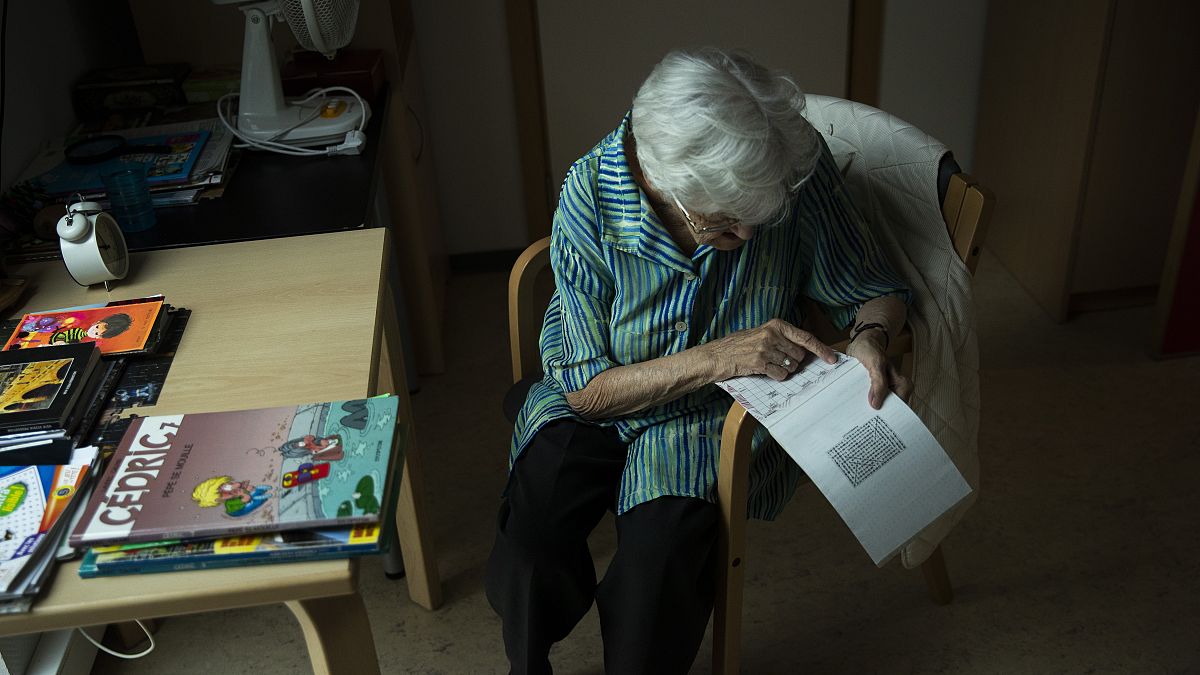Dutch researchers found differences in life expectancy by gender, geographic region, and age at dementia diagnosis.
About half of new patients will survive another five years after being diagnosed with dementia, according to a large new study that indicates there are major differences based on their age at diagnosis.
More than 57.4 million people have dementia worldwide, including over 12.7 million in Europe – and that burden is only expected to grow in the coming decades.
But precise, up-to-date estimates on how long patients can expect to live after they’ve been diagnosed are hard to come by, and life expectancy appears to vary greatly depending on patients’ location, age, gender, and other factors.
For the new analysis, published in The BMJ, Dutch researchers assessed data from 261 studies published between 1984 and 2024, spanning more than five million people with the neurodegenerative disease.
They found that 90 per cent of dementia patients were still alive one year after diagnosis, but prognosis fell over time, with just a 21 per cent chance of survival 10 years later.
The findings can help ensure “people with dementia have a better idea about what lies ahead, allowing them to make more informed choices about the time ahead,” Frank Wolters, an assistant professor at the Erasmus MC University Medical Centre in the Netherlands and the study’s senior author, told Euronews Health.
Women tended to live longer than men. At age 65, women lived an average of eight more years compared with 5.7 years among men, while at age 85, life expectancy was 4.5 years for women and 2.2 years for men, the analysis found.
The younger someone is when they are diagnosed with dementia, the longer they are expected to live. But even so, patients diagnosed at age 65 saw their life expectancy drop by up to 13 years, the study found.
“The disease disrupts what would otherwise be a much longer expected lifespan,” Julien Dumurgier, a neurology professor at the Lariboisière Hospital’s cognitive neurology centre in France, told Euronews Health.
That underscores “the disproportionate burden of early-onset dementia, where patients face a lengthy course of the disease alongside the loss of productive and active years,” added Dumurgier, who was not involved with the study.
‘Diversity among people with dementia’
In the study, Asians had a longer life expectancy than Europeans and Americans, while people with Alzheimer’s disease were more likely to survive longer than those with other forms of dementia, such as vascular dementia, frontotemporal dementia, and Lewy body dementia.
However, the researchers cautioned that while age, the cause of dementia, and its severity when a patient is diagnosed appear to be associated with survival, it’s still unclear how exactly those factors play a role.
“Dementias are progressive diseases that develop insidiously over many years, making it difficult to pinpoint their onset,” Dumurgier said.
Even so, the findings add some nuance to older studies on life after diagnosis.
One report, for example, found that new dementia patients live an average of 6.7 years if they are diagnosed before age 70, and 2.6 years if they are diagnosed after age 90.
Others peg the average survival time at 5.8 years after an Alzheimer’s diagnosis and five years after a dementia diagnosis.
Older adults with healthier lifestyles also tend to live longer, even if they have dementia.
“Current patient information often reflects the disease course of the average patient in a specialised memory clinic, but this insufficiently captures the diversity among people with dementia,” Wolters said.
“Our study unravels part of this diversity, which warrants more attention in the consultation room and in online patient information”.
The study also shed light on how people’s independence and healthcare needs change over time.
The average dementia patient moved into a nursing home 3.3 years after their diagnosis, spending about a third of their remaining time living in one of these facilities.
There were differences between the US and Europe and other parts of the world, likely due to cultural and health system differences, the researchers said.
The results are in line with previous research in the Netherlands that found people tend to move into institutions 3.9 years after being diagnosed with dementia.
Dumurgier said that understanding “the natural history” of dementia, as well as the typical timeline to enter nursing homes, could help doctors plan their patients’ care better. It could also help policymakers determine how to allocate funding and regulators to determine the potential benefits of new treatments that aim to slow the progression of the disease.
“The data from this meta-analysis offer a framework for evaluating whether these therapies could delay institutionalisation or extend survival,” Dumurgier said.
Checkout latest world news below links :
World News || Latest News || U.S. News
The post New dementia patients live fewer than 5 years after diagnosis appeared first on WorldNewsEra.

